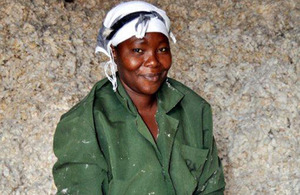Cottoning on to the power of the private sector
How UK aid works with the private sector to help lift people out of poverty in Africa

Kenyan farmer Ruth Muthai surrounded by cotton. Picture: AECF
Thirty-five-year-old Ruth Muthai is having a good year. All her children are back in school, she can afford to buy household essentials and her farm is growing and maturing.
In the Kerio valley in Kenya, where the land is rocky and the climate is unforgiving, Ruth’s situation sounds unlikely. But she’s not alone - thousands of farmers in the valley are telling the same story.
Fields of cotton
Thanks to support from UK aid and a private sector company, cotton growing is thriving in the region and farmers like Ruth have steady work and a regular wage. A once arid valley is now covered with fields of cotton and the economy of Kerio valley is being transformed.
“I now have a regular weekly income,” says Ruth. “I am able to pay for all my household items and I’ve also managed to extend my own farm.”
Ruth works at the local ginnery where the cotton is processed. She looks after some of the manual tasks such as moving the sifted cotton between rolling machines. Like many of her colleagues at the ginnery, she is also a smallholder farmer in the area.
“I used to lease my land to pay for school fees,” says Ruth.
“But the income that I get from my job at the ginnery means that I can grow cotton, maize and beans on my own land. I also employ someone to manage my farm as well as a cotton labourer who helps me with the cotton harvest.”
Innovative investments
The rejuvenation of the ginnery in Kerio valley is thanks to a partnership between a private sector company - Rift Valley Products - and a match-funding scheme which is run by the Africa Enterprise Challenge Fund (AECF) and supported by UK aid.
AECF invites companies like Rift Valley Products to compete for funding for innovative business ideas. The fund then provides the minimum investment needed to kick-start the best projects.
The companies have to match the AECF funding with their own finance and prove that the project is commercially viable and will have a positive impact on the rural poor in Africa.
Investing in farmers and the economy
As well as restoring the ginnery and creating jobs, Rift Valley Products provides training, demonstration plots, seeds and pesticides so that farmers can grow their own cotton.
The company also offers a direct route to market for small-scale farmers and gives them a good price for their produce, which stops farmers like Ruth being exploited by middlemen. The cotton is bought by the ginnery at regular points during the year and farmers are paid cash on collection.
In a region where crops like maize often struggle to survive, cotton growing gives farmers a way to earn money which they can use to feed and look after their families.
All these elements help to keep young people in the region, boost productivity and transform the local economy.
The power of the private sector
Support to projects like AECF forms part of DFID’s wider global commitment to give people the means to help work their way out of poverty. Economic growth is the most effective way to boost people’s incomes - by working with the private sector DFID will help to create jobs, increase trade and give poor people access to goods and services.
People still face extreme poverty and hardship in some parts of Africa, as the current food crisis in the Horn of Africa shows. But Africa is a vast, diverse continent which is also home to innovative businesses and enterprising communities.
By working with governments and the private sector to reduce the time it takes to start up new companies, UK aid is making it easier to do business in Africa. And by investing in infrastructure like roads and railways, the transport of goods around and out of the continent is becoming faster and more efficient.
Skills and ambition
Encouraging economic growth is the best way for countries to create opportunities for people like Ruth and to move away from dependence on aid.
And for Ruth, the benefit of harnessing the skills and ambitions of the private sector is clear. Her children are back in school, she’s financially stable and she has a job that she enjoys.
“Lots of people want to work in the ginnery,” she says. “Very few people leave and we are very happy here.”
By 2016 more than 12,000 farmers in Kenya will benefit from the UK aid supported project, helping them to permanently lift themselves out of poverty.
Facts and stats
AECF has 58 projects in 17 countries. UK aid from the Department for International Development funds nine of these projects and joint funds 29 others.
Each proposal for funding from AECF has to demonstrate how it will increase incomes and employment. It has to be cost effective, productive and innovative. It also has to have the potential to impact on the wider market.
Cotton is thought to offer the greatest potential for increased employment, reduced poverty and rapid economic development. It has been classified as a core industry by the Kenyan government.
In 2009-10 Kenya’s economy started recovering from the multiple shocks of electoral violence, droughts, food prices and global downturn. The country recorded modest growth of 2.6% in 2009, which doubled to 5.2% in 2010.
According to the World Bank, 39 African countries rose up its Ease of Doing Business Index between 2006 and 2011.